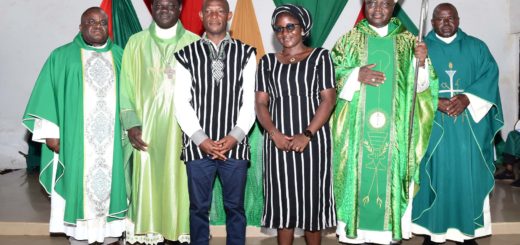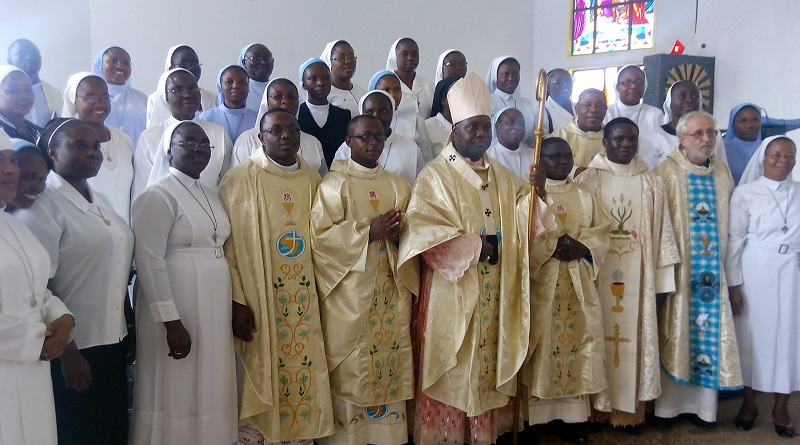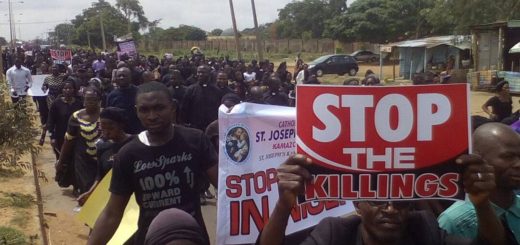Communicate God’s Love to the World
by ARCH BISHOP · May 12, 2024
Seventh Sunday of Easter/World Communications Day, 12th May 2024, St. Joseph’s Pastoral Area, Daki Biyu, Abuja. Homily by Archbishop I. A. Kaigama.
Readings: Acts 1:15-17.20a.20c-26; 1John 4: 11-16; John 17:11b-19
Communicate God’s Love to the World
Today is another unique day in our Archdiocese as we mark World Communications Day, taking place in St. Joseph Pastoral Area, Daki Biyu. As part of our evangelization effort and strategy, different groups in the Archdiocese of Abuja are always encouraged to go beyond the city centre to reach out to settlements either in the periphery of the FCT or those lacking social amenities or infrastructure.
On the 28th of January this year, about 500 lay readers (lectors) from all the parishes of Abuja gathered for their commissioning by me in St. Peter’s Catholic Church, Chukuku, a village hitherto very little known to many of the lectors. Many of them were surprised to discover the sharp contrast between the rural nature of Chukuku and the urban nature of Abuja with its highways, streetlights, and tall buildings. I had insisted from the first time I was invited to commission lectors, that they would join me at a rural parish Church in Zuma where most of them had to sit outside because of the small church. It was an opportunity for them to witness and participate in the pastoral expansion drive in the Archdiocese and the serious social deprivation suffered by some of the areas where our new pastoral areas are located.
For many Catholics, the Archdiocese is limited to the main parts of Abuja such as Garki, Wuse, Asokoro, Maitama, central Area, etc. With close to 70 pastoral areas created, in order to bring pastoral services to the interior and remote parts of the FCT, we encounter some settlements like our host community today, Daki Biyu, which has no Parish house or standard church building or even approved land; or like Iddo community by the airport-Gwagwalada road, which has been issued a quit notice that the settlers who have been there for decades are to leave to enable so-called government structures to be put up, without providing an alternative settlement. Some of our pastoral communities are today shadows of themselves, because of the menacing threats of kidnappers and bandits; while some have suffered the brutal attacks of criminals, resulting in multiple casualties.
Today, Christ prays for His followers to be true ambassadors of love, truth etc. He prayed not only for those present with Him at that moment but for all who would come to believe in Him. Through the words and actions of the believers, the message of salvation would be proclaimed or communicated to the ends of the earth. Christ’s prayer, “Father, consecrate them by means of truth. As you have sent me, so I have sent them into the world” (Jn17:17-18) means that all those who are consecrated in His name, are to bear witness to him and His Word.
The world into which we are sent to bear witness may indeed frighten us with all its problems: poverty, oppression, injustice and violence, abortion, addictions, same-sex marriage, etc. Yet, we are not to run away, but confront the problems with an intensity of faith, to bring about the transformation of the world through the grace of God.
The world may turn a deaf ear to our Good News; it may resist our every attempt to transform it; it may even strike back at us like a scorpion when we try to redeem it. But that is no reason why we should give up.
As Jesus’ disciples, we are not to allow ourselves to be stained by the world. We have a mission, a duty, such that we must “no longer be little children, disturbed and carried about by every wind of doctrine, by the wickedness of men, and by the craftiness which deceives unto error” (Eph 4:14).
Today also marks World Communications Day, a day set aside to reflect on the role of communication in our lives and in spreading the message of the Gospel. Communication is about building relationships, fostering understanding, and sharing the Good News of Jesus Christ. In a world filled with noise and distractions, it is essential for us to reflect on how we communicate with one another and with God.
Pope Paul VI established the World Communications Day in 1967, to help us reflect on the opportunities and challenges that the modern means of social communication (the press, motion pictures, radio, television and the internet) afford the Church to communicate the gospel message and all that is noble and honorable. Hence, this 58th World Communications Day, the Holy Father, Pope Francis, focuses on the theme: Artificial Intelligence and the Wisdom of the Heart: Towards a Fully Human Communication.
We are called to reflect on the impact of artificial intelligence on information communication and life in general. He highlights the fact that the development of artificial intelligence systems significantly affects everyone, and it is both exciting and disorientating. While the countless forms of communication can be used for good, they also have the potential to spread misinformation, sow division, and foster a culture of negativity.
As Artificial Intelligence (AI) advances, the question remains to be answered: How can we remain fully human and guide this innovation for the greater good? Pope Francis urges us to set aside catastrophic predictions and engage them with openness and sensitivity. Rejecting the new solely to preserve the past is not the solution. Instead, we must approach these challenges holistically. Thus, we cannot run the risk of becoming rich in technology but poor in humanity. Our actions, guided by modern technology, should begin from the human heart. By integrating AI with wisdom and compassion, we can create a more authentic and empathetic world, without overstepping the realms of God.
As technology advances, we must not lose sight of our humanity. This can have disastrous consequences as we read in the narrative of Genesis (11:1-7) which recounts that the whole earth had one language and wanted to build a city and a tower reaching up to heaven. They made appreciable progress, but God said, “Look, they are one people, and they have all one language; and this is only the beginning of what they will do; nothing that they propose to do will now be impossible for them. Come, let us go down, and confuse their language there, so that they will not understand one another’s speech.”
Their scientific success and progress recorded in building the city and its tower were frustrated when God eventually confused their language and they lost their oneness of language and understanding and started experiencing multidimensional problems and eventually everything fell apart.
On this World Communications Day, let us pray for all those who work in the field of communications, that they may be instruments of God’s peace and reconciliation, using their words and actions to build bridges rather than barriers.
In our Archdiocese, we must support the Catholic Television of Nigeria (CTV), the Good Shepherd Newspaper and Radio Maria, our local, humble but growing efforts for evangelization, correct information, and education in the faith and humanity.
We also pray for these 88 candidates who will be confirmed today, that they may become worthy ambassadors of Christ, ready to plunge into communicating the word of God by also using the modern means of communication; to be messengers of hope and reconciliation in a world that is full of bad news, and in desperate need of the Good News.
I call on our knowledgeable young people who use social media and other forms of social communication not to promote immorality and crime, but to spread those values and virtues that promote the common good and transform our world riddled with many social vices and anti-God policies and strategies.
I would like to see more of the presence of our youth in the Archdiocese spreading the pastoral, spiritual and social activities of our Archdiocese through the different forms of the media.
May the mass media effectively become an extraordinary resource to promote solidarity and understanding within the human family and not fuel prejudice and contempt between individuals and peoples; but contribute to spreading peace and ensuring objectivity, respect for human dignity, and attention to the common good; to bring down the walls of hostility that continue to divide humanity, and to strengthen the bonds of friendship and love.
From the election of Matthias in the first reading we in Nigeria should beware not to allow our unhealthy political scheming to prevail each time we conduct elections. See the example of a flawless, God-inspired election. No violence, no rigging, no court case, no bitterness.
Let us do all it takes to develop our nation, to realize that all our political or economic actions must be inspired by ethics and morality. We cannot see politics as only a means to affluence, influence /and unbridled access to our common patrimony. Enough of politics riddled with corruption that pervades the primary elections, the real elections and even court processes.
Do not exclude morality from politics. Your actions should reflect God’s love as the second reading exhorts us. And in the election of Matthias in Acts of the Apostles, we see how the assembled disciples recognized clearly that God’s will is supreme, and so they prayed and left the final choice to God. That was how Matthias was chosen as an apostle. May our leaders be guided by such ethical and God-fearing conduct during elections and in governance.
In this month of May as we pray our Rosary daily, may we all experience greater inner, social, political, and economic transformation.




